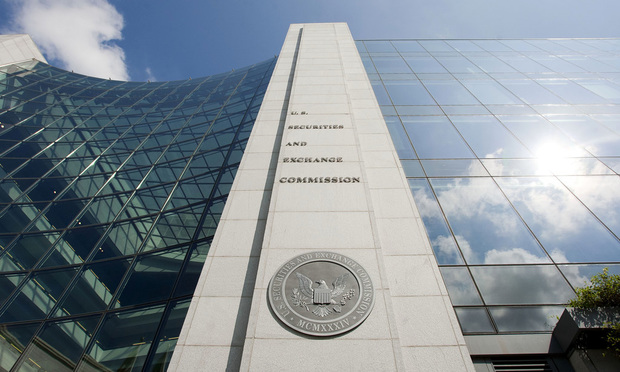SEC Allowed to Pursue Fraud Claims Against Rio Tinto, Former Executives
A federal judge in Manhattan has allowed the U.S. Securities and Exchange Commission to proceed with a lawsuit accusing the multinational mining firm Rio Tinto and two former executives of fraud in connection with its failed investment in a Mozambique coal project.
March 18, 2019 at 04:55 PM
4 minute read
 Headquarters of the U.S. Securities and Exchange Commission in Washington, D.C. (Photo: Diego M. Radzinschi/NLJ)
Headquarters of the U.S. Securities and Exchange Commission in Washington, D.C. (Photo: Diego M. Radzinschi/NLJ)
A federal judge in Manhattan has allowed the U.S. Securities and Exchange Commission to proceed with a lawsuit accusing the multinational mining firm Rio Tinto and two former executives of fraud in connection with its failed investment in a Mozambique coal project.
U.S. District Judge Analisa Torres of the Southern District of New York on Monday denied Rio Tinto's motion to dismiss the enforcement action, finding that the SEC had supported some claims that the company, its former Chief Executive Thomas Albanese and former Chief Financial Officer Guy Robert Elliott had misled the firm's directors and investors about the prospects for the $3.7 billion venture, starting in May 2012.
In its October 2017 complaint, the SEC said that the Rio Tinto, Albanese and Elliott hid a range of setbacks at the mine, which it purchased through a takeover of the former Riversdale Mining company in 2011. According to the SEC, the defendants had overvalued the firm's mining assets, despite an internal assessment that valued them at negative $680 million, and allowed Rio Tinto to raise $5.5 billion from U.S. investors.
“Privately, defendants knew [the assets] had little or no commercial value. Nevertheless, defendants undermined the impairment process required under International Accounting Standards and Rio Tinto's accounting policies,” attorneys from the SEC wrote in the complaint.
The company ultimately took a $3 billion writedown for the Mozambique project and sold the assets for just $50 million in 2014, according to court documents.
The defendants moved to dismiss the case last year, arguing that the SEC had failed to establish a case for fraud. According to motion, optimistic company statements cited by the regulators amounted to “inactionable puffery,” and investors had no reason to believe that any risks omitted from public statements and filings did not actually exist.
On Monday, however, Torres ruled that the SEC had “plausibly alleged” falsity in Rio Tinto's semi-annual financials in 2012, after the defendants had learned about the project's negative valuation. Statements about the “number” and “breadth” of the company's options for transporting coal in Mozambique, as well as the extent of the writedown Rio Tinto had anticipated were also suspect, she said.
Though Torres found no evidence that they had intended to overvalue Rio Tinto Coal Mozambique in the 2012 half-year filing, Albanese and Elliott will still face claims that their conduct led to the miscue.
“Albanese was aware that the best information indicated that RTCM had no value and no realistic options for transportation of coal, but he continued to tout it as being 'prospective' and a 'long-term opportunity with the potential to grow beyond 25 million tons of coal per year,'” Torres said in her 50-page ruling. “Through these statements, Albanese was 'misrepresenting material facts' to investors.”
An attorney for Rio Tinto declined to comment Monday afternoon, saying he had not yet received permission from his client to discuss the case publicly. Attorneys for Albanese and Elliott were not immediately available to comment.
A spokesman for the SEC declined to comment on Monday.
SEC attorneys Dean Michael Conway, Gregory Nelson Miller, Martin Totaro, Thomas A Bednar and David Mark Cave are representing the agency in the case.
Rio Tinto is represented by Lawrence Jay Zweifach, Avi Weitzman, Jennifer Laurie Conn, Mark Adam Kirsch and Michael Springer of Gibson, Dunn & Crutcher in New York and Alexander W. Mooney, Aric Hugo Wu and Kellam Conover from the firm's office in Washington, D.C.
Albanese is represented by Peter J. Romatowski, Melissa Lim Patterson and Kristen Allyssa Lejnieks of Jones Day in Washington, D.C.; David Ronald Woodcock and Tyson Mark Lies in Dallas and Jacqueline Vallette and Norman Scott Fletcher in Houston.
Elliott is represented by Theodore Von Wells Jr., Geoffrey Rogers Chepiga, Livia Fine and Walter G. Ricciardi of Paul, Weiss, Rifkind, Wharton & Garrison in New York.
The case is captioned SEC v. Rio Tinto.
This content has been archived. It is available through our partners, LexisNexis® and Bloomberg Law.
To view this content, please continue to their sites.
Not a Lexis Subscriber?
Subscribe Now
Not a Bloomberg Law Subscriber?
Subscribe Now
NOT FOR REPRINT
© 2025 ALM Global, LLC, All Rights Reserved. Request academic re-use from www.copyright.com. All other uses, submit a request to [email protected]. For more information visit Asset & Logo Licensing.
You Might Like
View All
Lukoil Pan Americas Sues Investment Firm Over Alleged $18 Million Breach

New York Court of Appeals Weighs How to Assess Exposure to Asbestos in Talc Lawsuit

Foley & Lardner Sign on to Represent Defendants in Cryptocurrency Case
Trending Stories
- 1FTX One Year Later: The Impact on Examiner Practice in Bankruptcy Courts
- 2Gen AI Legal Contract Startup Ivo Announces $16 Million Series A Funding Round
- 3DOJ's Flawed Thinking in Challenging HPE-Juniper Merger
- 4Annual Self-Check: Testing For Bias On The Bench
- 5'None of Us Like It': How Expedited Summer Associate Recruiting Affects Law Students and the Firms Hiring Them
Who Got The Work
J. Brugh Lower of Gibbons has entered an appearance for industrial equipment supplier Devco Corporation in a pending trademark infringement lawsuit. The suit, accusing the defendant of selling knock-off Graco products, was filed Dec. 18 in New Jersey District Court by Rivkin Radler on behalf of Graco Inc. and Graco Minnesota. The case, assigned to U.S. District Judge Zahid N. Quraishi, is 3:24-cv-11294, Graco Inc. et al v. Devco Corporation.
Who Got The Work
Rebecca Maller-Stein and Kent A. Yalowitz of Arnold & Porter Kaye Scholer have entered their appearances for Hanaco Venture Capital and its executives, Lior Prosor and David Frankel, in a pending securities lawsuit. The action, filed on Dec. 24 in New York Southern District Court by Zell, Aron & Co. on behalf of Goldeneye Advisors, accuses the defendants of negligently and fraudulently managing the plaintiff's $1 million investment. The case, assigned to U.S. District Judge Vernon S. Broderick, is 1:24-cv-09918, Goldeneye Advisors, LLC v. Hanaco Venture Capital, Ltd. et al.
Who Got The Work
Attorneys from A&O Shearman has stepped in as defense counsel for Toronto-Dominion Bank and other defendants in a pending securities class action. The suit, filed Dec. 11 in New York Southern District Court by Bleichmar Fonti & Auld, accuses the defendants of concealing the bank's 'pervasive' deficiencies in regards to its compliance with the Bank Secrecy Act and the quality of its anti-money laundering controls. The case, assigned to U.S. District Judge Arun Subramanian, is 1:24-cv-09445, Gonzalez v. The Toronto-Dominion Bank et al.
Who Got The Work
Crown Castle International, a Pennsylvania company providing shared communications infrastructure, has turned to Luke D. Wolf of Gordon Rees Scully Mansukhani to fend off a pending breach-of-contract lawsuit. The court action, filed Nov. 25 in Michigan Eastern District Court by Hooper Hathaway PC on behalf of The Town Residences LLC, accuses Crown Castle of failing to transfer approximately $30,000 in utility payments from T-Mobile in breach of a roof-top lease and assignment agreement. The case, assigned to U.S. District Judge Susan K. Declercq, is 2:24-cv-13131, The Town Residences LLC v. T-Mobile US, Inc. et al.
Who Got The Work
Wilfred P. Coronato and Daniel M. Schwartz of McCarter & English have stepped in as defense counsel to Electrolux Home Products Inc. in a pending product liability lawsuit. The court action, filed Nov. 26 in New York Eastern District Court by Poulos Lopiccolo PC and Nagel Rice LLP on behalf of David Stern, alleges that the defendant's refrigerators’ drawers and shelving repeatedly break and fall apart within months after purchase. The case, assigned to U.S. District Judge Joan M. Azrack, is 2:24-cv-08204, Stern v. Electrolux Home Products, Inc.
Featured Firms
Law Offices of Gary Martin Hays & Associates, P.C.
(470) 294-1674
Law Offices of Mark E. Salomone
(857) 444-6468
Smith & Hassler
(713) 739-1250







